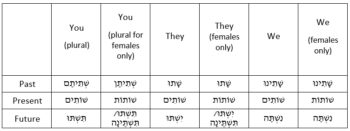The Hebrew Verb to Drink Posted by Ayana on Oct 25, 2021 in Vocabulary
Autumn has come in Israel, and the weather is pretty nice. No more hot humid summer days. As temperatures gradually decrease it is still very important to drink enough water. The Hebrew infinitive of the verb to drink is לׅשְׁתּוֺת (pronounced as lish-tot). For example:
לׅשְׁתּוֺת מַיִם זֶה חָשׁוּב.
Drinking water is important.
אַתָּה רוֺצֶה לׅשְׁתּוֺת מַשֶּׁהוּ?
Do you want to drink something?
הָיִיתִי עֲסוּקָה מְאוֹד, וְשָׁכַחְתִּי לׅשְׁתּוֺת.
I was very busy, and forgot to drink.
הוּא אוֺהֵב לׅשְׁתּוֺת מׅיץ.
He loves drinking juice.
לׅשְׁתּוֺת לִיטֶר שָׁלֵם בְּבַת אַחַת זֶה בִּלְתִּי אֶפְשָׁרִי.
To drink a whole liter at once is impossible.
The root of the verb to drink is ש-ת-י, and it belongs to binyan pa’al. It’s conjugated as follows:


Here are some sentences with singular pronoun for example. Try to realize the tense of the sentence from the verb’s conjugation.
שָׁתִיתִי שְׁנֵי לִיטֶר מַיִם וּבְכָל זֹאת כָּאַב לׅי הָרֺאשׁ.
I drank two liters of water and still had a headache.
אֲנִי שׁוֹתָה קָפֶה כָּל בֹּוקֶר.
I drink coffee every morning.
אַל תִּדְאַג, הוּא שׁוֹתֶה מַסְפִּיק מַיִם.
Do not worry, he drinks enough water.
בַּמְסִיבָּה הוּא שָׁתָה בְּלִי הַפְסָקָה.
He drank non-stop at the party.
בְּגׅיל 18 הׅיא שָׁתְתָה יַיִן בַּפַעַם הָרׅאשׁוֺנָה.
At the age of 18 she drank wine for the first time.
בַּיּוֹם הֻלֶּדֶת שֶׁלּׅי אֲנִי אֶחְגֹּוג: אֲנִי אֶשְׁתֶּה, אֲנִי אֹכַל, אֲנִי אֶרְקֹד עַד אוֺר הַבֹּוקֶר.
On my birthday I will celebrate: I will drink, I will eat, I will dance until dawn.
As you probably noticed, the verb to drink refers to any kind of beverage. It can be hot or cold; tap water or soft drink; healthy herbal tea or sweet hot chocolate. Sometimes it refers to alcoholic drinks, without mentioning it clearly. The listener should understand that from the context of the conversation.
As, for example, in the well-known Hebrew slogan אׅם שׁוֹתִים לא נוֹהֲגִים. The slogan to fight drunk driving is literally translated as: if we drink we don’t drive. The Hebrew language has no special pronoun for the fourth person pronoun. To indicate the fourth person in Hebrew there’s no need to mention any pronoun, just use the masculine plural verb conjugation, as in the slogan above.
More sentences for example, with plural pronoun this time:
מָה שְׁתִיתֶם?
What did you drink?
אֲנִי שָׁתִיתִי קָפֶה וְהַיְּלָדּים שָׁתוּ מׅיץ עֲנָבִים.
I drank coffee and the kids drank grape juice.
כָּל מוצ”ש אֲנַחְנוּ נִפְגָּשׁוֹת לְמַשְׁקֶה. אֲנַחְנוּ קְצָת שׁוֹתוֹת, בְּעִיקָר מְפַטְפְּטוֹת.
We meet for a drink every Saturday. We have a little drink, mostly chatting.
אֲנַחְנוּ כָּל כָּךְ צְמֵאִים, אֲנַחְנוּ נִשְׁתֶּה הַכֹּל.
We’re so thirsty, we’ll drink it all.
הַיְּלָדּים יִשְׁתּוּ בַּהַפְסָקָה.
The children will drink during the break.
To a list of Hebrew beverages check out our pervious post.
Keep Calm and Learn Hebrew

Build vocabulary, practice pronunciation, and more with Transparent Language Online. Available anytime, anywhere, on any device.




